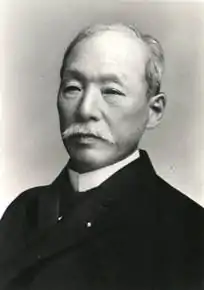
Shigeyoshi Matsuo (松尾 臣善, Matsuo Shigeyoshi, March 6, 1843 – April 7, 1916) was a Japanese businessman, central banker and the 6th Governor of the Bank of Japan (BOJ). He was a Baron and a member of Japan's House of Peers from 1900 through 1916.[1]
Early life
Matsuo was born in Hyogo Prefecture.[2]
Career
In 1900, Matsuo had risen to the position of bureau chief in the Finance Ministry.[3]
Matsuo was BOJ Governor from October 20, 1903, to June 1, 1911.[4] During his term, the bank managed the money supply to restrain inflation.[5]
In 1904, Matsuo assembled the heads of 35 commercial banks, offering favourable terms for lending by BOJ.[5]
Matsuo construed complaints about "bad times" to mean that economic conditions were normal, and that there had been diminished opportunities for speculation.[6]
Notes
- ↑ Augello, Massimo et al. (2005). Economists in Parliament in the Liberal Age (1848–1920), p. 278 n39., p. 278, at Google Books
- ↑ Bank of Japan (BOJ), 6th Governor
- ↑ Duus, Peter. (1995). The Abacus and the Sword: The Japanese Penetration of Korea, 1895-1910, p. 162., p. 162, at Google Books
- ↑ BOJ, List of Governors.
- 1 2 Wolf, David et al. (2007). The Russo-Japanese War in Global Perspective: World War Zero, p. 263., p. 263, at Google Books
- ↑ Matsuo, Shigeyoshi. (1911). "The Banking Year in Japan in 1910," in The Market world and Chronicle, Vol. 1, p. 20., p. 20, at Google Books
References
- Augello, Massimo M. and Marco Enrico Luigi Guidi. (2005). Economists in Parliament in the Liberal Age (1848-1920). Burlington: Ashgate.ISBN 9780754639657; OCLC 470670050
- Duus, Peter. (1995). The Abacus and the Sword: The Japanese Penetration of Korea, 1895-1910. Berkeley: University of California Press.ISBN 9780520086142 OCLC 232346524